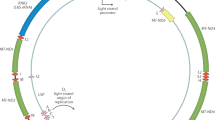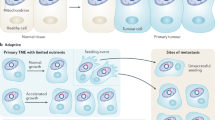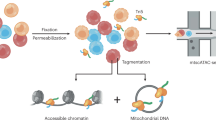Abstract
The presence of hundreds of copies of mitochondrial DNA (mtDNA) in each human cell poses a challenge for the complete characterization of mtDNA genomes by conventional sequencing technologies1. Here we describe digital sequencing of mtDNA genomes with the use of massively parallel sequencing-by-synthesis approaches. Although the mtDNA of human cells is considered to be homogeneous, we found widespread heterogeneity (heteroplasmy) in the mtDNA of normal human cells. Moreover, the frequency of heteroplasmic variants varied considerably between different tissues in the same individual. In addition to the variants identified in normal tissues, cancer cells harboured further homoplasmic and heteroplasmic mutations that could also be detected in patient plasma. These studies provide insights into the nature and variability of mtDNA sequences and have implications for mitochondrial processes during embryogenesis, cancer biomarker development and forensic analysis. In particular, they demonstrate that individual humans are characterized by a complex mixture of related mitochondrial genotypes rather than a single genotype.
This is a preview of subscription content, access via your institution
Access options
Subscribe to this journal
Receive 51 print issues and online access
$199.00 per year
only $3.90 per issue
Buy this article
- Purchase on Springer Link
- Instant access to full article PDF
Prices may be subject to local taxes which are calculated during checkout

Similar content being viewed by others
References
Legros, F., Malka, F., Frachon, P., Lombes, A. & Rojo, M. Organization and dynamics of human mitochondrial DNA. J. Cell Sci. 117, 2653–2662 (2004)
Schneider, P. M. Scientific standards for studies in forensic genetics. Forensic Sci. Int. 165, 238–243 (2007)
Wong, L. J. & Boles, R. G. Mitochondrial DNA analysis in clinical laboratory diagnostics. Clin. Chim. Acta 354, 1–20 (2005)
White, H. E. et al. Accurate detection and quantitation of heteroplasmic mitochondrial point mutations by pyrosequencing. Genet. Test. 9, 190–199 (2005)
Maitra, A. et al. The Human MitoChip: a high-throughput sequencing microarray for mitochondrial mutation detection. Genome Res. 14, 812–819 (2004)
Dobrowolski, S. F., Gray, J., Miller, T. & Sears, M. Identifying sequence variants in the human mitochondrial genome using high-resolution melt (HRM) profiling. Hum. Mutat. 30, 891–898 (2009)
Kraytsberg, Y., Nicholas, A., Caro, P. & Khrapko, K. Single molecule PCR in mtDNA mutational analysis: genuine mutations vs. damage bypass-derived artifacts. Methods 46, 269–273 (2008)
Kajander, O. A. et al. Human mtDNA sublimons resemble rearranged mitochondrial genoms found in pathological states. Hum. Mol. Genet. 9, 2821–2835 (2000)
Santos, C. et al. Frequency and pattern of heteroplasmy in the control region of human mitochondrial DNA. J. Mol. Evol. 67, 191–200 (2008)
Greaves, L. C. et al. Quantification of mitochondrial DNA mutation load. Aging Cell 8, 566–572 (2009)
Kraytsberg, Y. et al. Quantitative analysis of somatic mitochondrial DNA mutations by single-cell single-molecule PCR. Methods Mol. Biol. 554, 329–369 (2009)
Osborne, A., Reis, A. H., Bach, L. & Wangh, L. J. Single-molecule LATE-PCR analysis of human mitochondrial genomic sequence variations. PLoS ONE 4, e5636 (2009)
Michikawa, Y., Mazzucchelli, F., Bresolin, N., Scarlato, G. & Attardi, G. Aging-dependent large accumulation of point mutations in the human mtDNA control region for replication. Science 286, 774–779 (1999)
Wang, Y. et al. Muscle-specific mutations accumulate with aging in critical human mtDNA control sites for replication. Proc. Natl Acad. Sci. USA 98, 4022–4027 (2001)
Ramos, A., Santos, C., Alvarez, L., Nogues, R. & Aluja, M. P. Human mitochondrial DNA complete amplification and sequencing: a new validated primer set that prevents nuclear DNA sequences of mitochondrial origin co-amplification. Electrophoresis 30, 1587–1593 (2009)
Zsurka, G. et al. Recombination of mitochondrial DNA in skeletal muscle of individuals with multiple mitochondrial DNA heteroplasmy. Nature Genet. 37, 873–877 (2005)
Marzuki, S. et al. Developmental genetics of deleted mtDNA in mitochondrial oculomyopathy. J. Neurol. Sci. 145, 155–162 (1997)
Taylor, R. W. et al. Mitochondrial DNA mutations in human colonic crypt stem cells. J. Clin. Invest. 112, 1351–1360 (2003)
Coller, H. A. et al. Clustering of mutant mitochondrial DNA copies suggests stem cells are common in human bronchial epithelium. Mutat. Res. 578, 256–271 (2005)
Polyak, K. et al. Somatic mutations of the mitochondrial genome in human colorectal tumours. Nature Genet. 20, 291–293 (1998)
Jones, J. B. et al. Detection of mitochondrial DNA mutations in pancreatic cancer offers a ‘mass’-ive advantage over detection of nuclear DNA mutations. Cancer Res. 61, 1299–1304 (2001)
Chatterjee, A., Mambo, E. & Sidransky, D. Mitochondrial DNA mutations in human cancer. Oncogene 25, 4663–4674 (2006)
Wong, L. J., Lueth, M., Li, X. N., Lau, C. C. & Vogel, H. Detection of mitochondrial DNA mutations in the tumor and cerebrospinal fluid of medulloblastoma patients. Cancer Res. 63, 3866–3871 (2003)
Coller, H. A. et al. High frequency of homoplasmic mitochondrial DNA mutations in human tumors can be explained without selection. Nature Genet. 28, 147–150 (2001)
Jones, S. et al. Comparative lesion sequencing provides insights into tumor evolution. Proc. Natl Acad. Sci. USA 105, 4283–4288 (2008)
Sidransky, D. Emerging molecular markers of cancer. Nature Rev. Cancer 2, 210–219 (2002)
Fliss, M. S. et al. Facile detection of mitochondrial DNA mutations in tumors and bodily fluids. Science 287, 2017–2019 (2000)
Diehl, F. et al. Circulating mutant DNA to assess tumor dynamics. Nature Med. 14, 985–990 (2008)
Sekiguchi, K., Kasai, K. & Levin, B. C. Inter- and intragenerational transmission of a human mitochondrial DNA heteroplasmy among 13 maternally-related individuals and differences between and within tissues in two family members. Mitochondrion 2, 401–414 (2003)
Sekiguchi, K., Sato, H. & Kasai, K. Mitochondrial DNA heteroplasmy among hairs from single individuals. J. Forensic Sci. 49, 986–991 (2004)
Acknowledgements
We thank M. Whalen, J. Ptak, L. Dobbyn and N. Silliman for expert technical assistance. This work was supported by The Virginia and D. K. Ludwig Fund for Cancer Research and by National Institutes of Health grants CA57345, CA 43460, CA 62924 and CA121113.
Author Contributions Y.H., K.W.K., B.V. and N.P. designed and performed experiments, analysed data and wrote the paper. J.W. and D.C.D. performed experiments and analysed data. C.I.-D., S.D.M. and L.A.D. provided critical materials and reagents. V.E.V. analysed data and provided input to the manuscript.
Author information
Authors and Affiliations
Corresponding authors
Ethics declarations
Competing interests
Under agreements between the Johns Hopkins University, Genzyme, Exact Sciences, Beckman, Inostics, and Invitrogen, K.W.K., B.V., D.C.D., V.E.V., N.P., and L.A.D. are entitled to a share of the royalties received by the University on sales of products related to genes or technologies described in this manuscript. The University, K.W.K. and B.V. own stock in Genzyme and K.W.K., B.V., V.E.V., N.P., and L.A.D. own stock in Inostics, both of which are subject to certain restrictions under Johns Hopkins University policy. The terms of these arrangements are being managed by the Universities in accordance with their conflict of interest policies.
Supplementary information
Supplementary Information
This file contains Supplementary Figures 1-4 with legends, and Supplementary Tables 1-8. (PDF 498 kb)
PowerPoint slides
Rights and permissions
About this article
Cite this article
He, Y., Wu, J., Dressman, D. et al. Heteroplasmic mitochondrial DNA mutations in normal and tumour cells. Nature 464, 610–614 (2010). https://doi.org/10.1038/nature08802
Received:
Accepted:
Published:
Issue Date:
DOI: https://doi.org/10.1038/nature08802
This article is cited by
-
Mitochondrial point heteroplasmy: insights from deep-sequencing of human replicate samples
BMC Genomics (2024)
-
Induced pluripotent stem cells: ex vivo models for human diseases due to mitochondrial DNA mutations
Journal of Biomedical Science (2023)
-
In vivo imaging of mitochondrial DNA mutations using an integrated nano Cas12a sensor
Nature Communications (2023)
-
Pathogenesis of cancers derived from thyroid follicular cells
Nature Reviews Cancer (2023)
-
Identification of human mitochondrial RNA cleavage sites and candidate RNA processing factors
BMC Biology (2022)
Comments
By submitting a comment you agree to abide by our Terms and Community Guidelines. If you find something abusive or that does not comply with our terms or guidelines please flag it as inappropriate.



